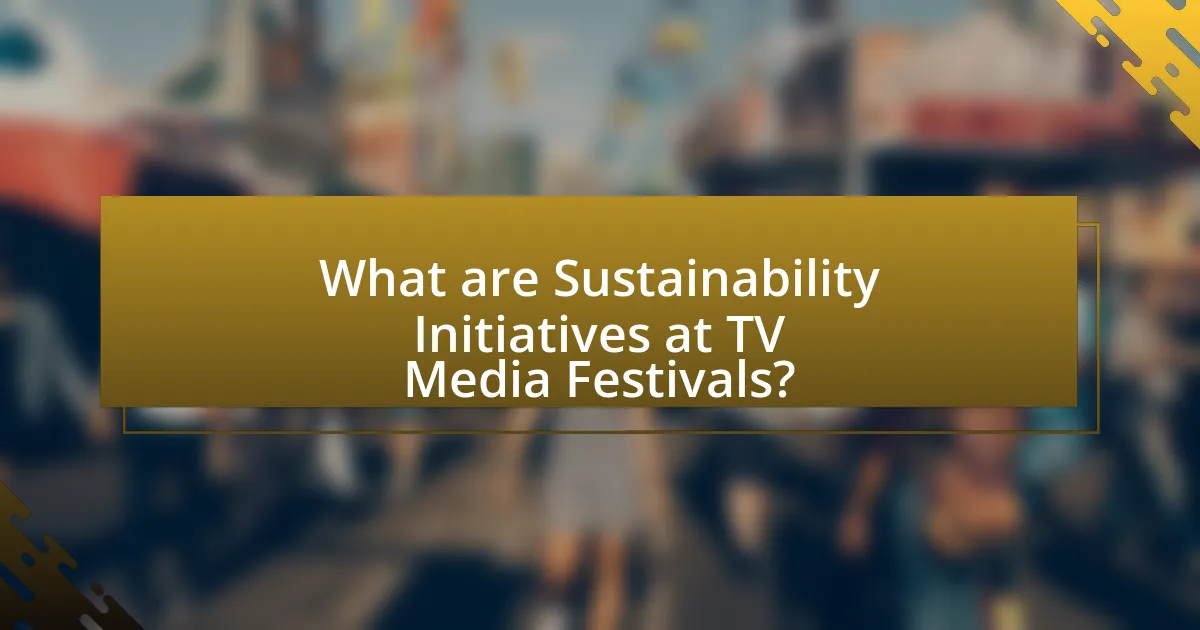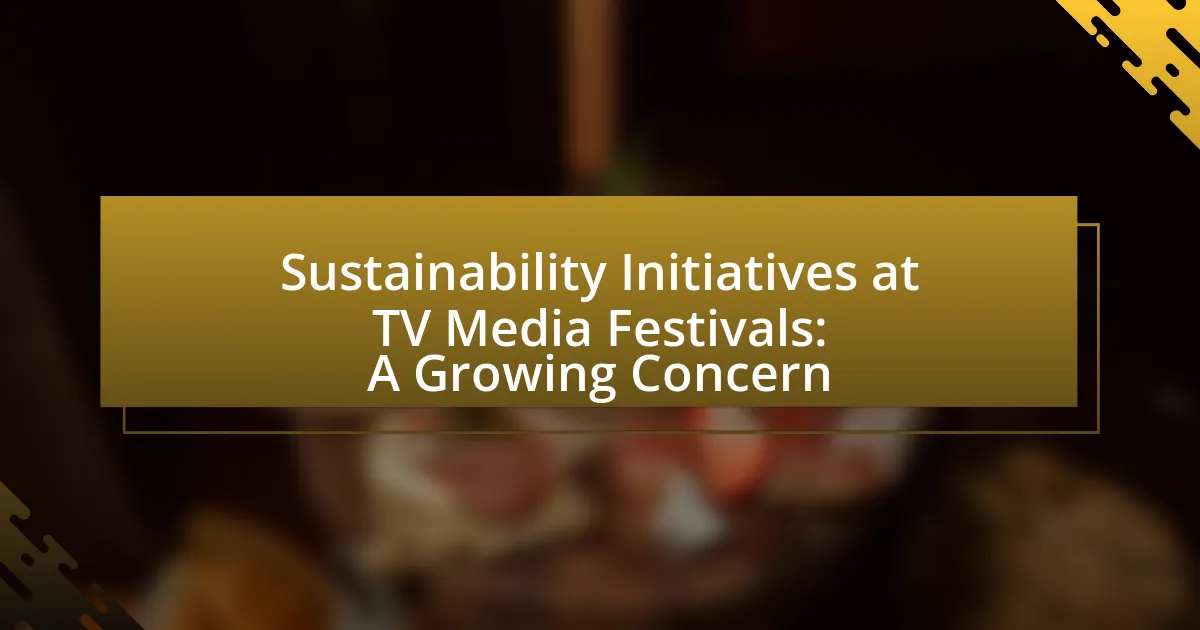Sustainability initiatives at TV media festivals are increasingly focused on reducing environmental impact and promoting eco-friendly practices. These initiatives include waste reduction through recycling programs, the use of renewable energy sources, and digital content distribution to minimize paper usage. The article examines the growing priority of sustainability in the media industry, the environmental impacts of traditional festivals, and the various practices being implemented to address these challenges. It also discusses the role of stakeholders, including sponsors and attendees, in promoting sustainability, the benefits of these initiatives, and future trends that may shape the landscape of media festivals.

What are Sustainability Initiatives at TV Media Festivals?
Sustainability initiatives at TV media festivals focus on reducing environmental impact and promoting eco-friendly practices. These initiatives often include measures such as minimizing waste through recycling programs, utilizing renewable energy sources for event operations, and encouraging digital content distribution to reduce paper usage. For example, the 2021 Cannes Film Festival implemented a comprehensive sustainability plan that included carbon offsetting and partnerships with local organizations to promote sustainable transportation options for attendees. Such efforts reflect a growing recognition within the industry of the need to address climate change and promote sustainability in media production and events.
Why are Sustainability Initiatives becoming a priority in the media industry?
Sustainability initiatives are becoming a priority in the media industry due to increasing public awareness of environmental issues and the industry’s significant carbon footprint. The media sector is responsible for substantial greenhouse gas emissions, prompting stakeholders to adopt sustainable practices to mitigate their impact. For instance, a report by the Carbon Trust indicates that the television and film industry contributes approximately 3% of global carbon emissions, highlighting the urgent need for change. Additionally, consumer demand for environmentally responsible content and practices is rising, with studies showing that 70% of viewers prefer brands that demonstrate sustainability efforts. This shift is driving media companies to prioritize sustainability initiatives to align with audience expectations and regulatory pressures.
What environmental impacts are associated with traditional TV media festivals?
Traditional TV media festivals are associated with several environmental impacts, primarily including significant waste generation, high energy consumption, and carbon emissions. These festivals often produce large amounts of single-use plastics, food waste, and promotional materials that contribute to landfill overflow. For instance, a study by the Green Festival Initiative found that major festivals can generate over 100 tons of waste, with only a fraction being recycled. Additionally, the energy required to power stages, lighting, and equipment often relies on fossil fuels, leading to increased greenhouse gas emissions. According to the Carbon Trust, events can emit up to 1,000 tons of CO2, depending on their size and duration. These factors highlight the pressing need for sustainable practices within the framework of traditional TV media festivals.
How do sustainability initiatives address these environmental impacts?
Sustainability initiatives at TV media festivals address environmental impacts by implementing practices that reduce waste, conserve energy, and promote eco-friendly materials. For instance, many festivals have adopted zero-waste policies, which aim to divert at least 90% of waste from landfills through recycling and composting. Additionally, the use of renewable energy sources, such as solar panels, has been integrated into festival operations to minimize carbon footprints. A study by the Green Festival Association found that festivals adopting these initiatives can reduce their overall environmental impact by up to 50%, demonstrating the effectiveness of these strategies in mitigating ecological harm.
What types of Sustainability Initiatives are being implemented?
Sustainability initiatives being implemented at TV media festivals include waste reduction programs, energy-efficient practices, and sustainable sourcing of materials. These initiatives aim to minimize the environmental impact of events by promoting recycling, using renewable energy sources, and selecting eco-friendly vendors. For instance, festivals are increasingly adopting zero-waste policies, which have been shown to significantly decrease landfill contributions, as evidenced by the success of the 2021 Cannes Film Festival, which achieved a 50% reduction in waste through such measures.
What are the most common practices adopted by TV media festivals?
The most common practices adopted by TV media festivals include implementing eco-friendly measures, promoting digital submissions, and engaging in community outreach. Eco-friendly measures often involve reducing waste through recycling programs and using sustainable materials for event setups. Digital submissions minimize paper use and streamline the entry process, reflecting a shift towards more environmentally conscious practices. Community outreach initiatives typically focus on educating attendees about sustainability and fostering local partnerships to enhance social responsibility. These practices are increasingly recognized as essential for aligning with global sustainability goals and addressing environmental concerns within the media industry.
How do these practices vary across different festivals?
Sustainability practices vary significantly across different TV media festivals, reflecting the unique cultural, environmental, and logistical contexts of each event. For instance, the Cannes Film Festival emphasizes reducing carbon footprints through initiatives like digital ticketing and local sourcing of materials, while the Sundance Film Festival focuses on waste reduction by implementing comprehensive recycling and composting programs. Additionally, the Toronto International Film Festival has adopted a green certification program that encourages filmmakers to adopt sustainable practices in their productions. These variations are influenced by factors such as local regulations, audience expectations, and the festival’s overall mission, demonstrating a tailored approach to sustainability in the media festival landscape.
What challenges do TV media festivals face in implementing Sustainability Initiatives?
TV media festivals face significant challenges in implementing sustainability initiatives, primarily due to financial constraints, logistical complexities, and stakeholder engagement. Financially, many festivals operate on tight budgets, making it difficult to allocate resources for sustainable practices, such as waste reduction and carbon offsetting. Logistically, coordinating sustainable initiatives requires comprehensive planning and collaboration with vendors, which can be complicated by the scale and diversity of festival activities. Additionally, engaging stakeholders, including sponsors, attendees, and local communities, poses a challenge as differing priorities and levels of commitment can hinder the effective implementation of sustainability measures. These factors collectively impede the progress of sustainability initiatives within the context of TV media festivals.
What financial constraints impact the adoption of sustainable practices?
Financial constraints that impact the adoption of sustainable practices include high initial investment costs, limited access to funding, and ongoing operational expenses. High initial investment costs deter organizations from implementing sustainable technologies, as they often require significant upfront capital. Limited access to funding, particularly for smaller organizations, restricts their ability to invest in sustainable initiatives. Ongoing operational expenses, such as maintenance and training for sustainable practices, can further strain budgets, making it challenging to sustain these initiatives over time. According to a report by the International Finance Corporation, 70% of small and medium enterprises cite access to finance as a major barrier to adopting sustainable practices.
How do logistical issues hinder sustainability efforts at festivals?
Logistical issues significantly hinder sustainability efforts at festivals by complicating waste management, resource allocation, and transportation. For instance, inadequate planning can lead to excessive waste generation, as seen in the 2019 Glastonbury Festival, where over 1,000 tons of waste were produced, much of which could have been recycled or composted. Additionally, inefficient transportation logistics can increase carbon emissions, as demonstrated by the 2020 Coachella Festival, which reported that transportation accounted for 60% of its total carbon footprint. These logistical challenges create barriers to implementing effective sustainability practices, ultimately undermining the festivals’ environmental goals.
How are stakeholders responding to Sustainability Initiatives?
Stakeholders are increasingly supportive of sustainability initiatives, recognizing their importance for long-term viability and brand reputation. For instance, many media companies are adopting eco-friendly practices, such as reducing waste and carbon emissions, in response to stakeholder demands for corporate responsibility. Research indicates that 70% of consumers prefer brands that demonstrate environmental stewardship, highlighting the pressure on stakeholders to align with sustainability goals. Additionally, investors are increasingly considering environmental, social, and governance (ESG) factors in their decision-making, with a reported 88% of investors prioritizing companies with strong sustainability practices. This shift reflects a broader trend where stakeholders view sustainability as integral to business strategy and competitive advantage.
What role do sponsors play in promoting sustainability at festivals?
Sponsors play a crucial role in promoting sustainability at festivals by providing financial support and resources that enable eco-friendly initiatives. Their investment often funds sustainable practices such as waste reduction, renewable energy use, and environmentally responsible materials. For instance, major sponsors like Coca-Cola and Unilever have implemented recycling programs and sustainable packaging at events, demonstrating their commitment to reducing environmental impact. Additionally, sponsors can influence festival organizers to adopt greener policies by prioritizing sustainability in their partnerships, thereby setting industry standards. This collaborative approach not only enhances the festival’s reputation but also engages attendees in sustainability efforts, fostering a culture of environmental responsibility within the community.
How do attendees influence the push for sustainable practices?
Attendees influence the push for sustainable practices by actively advocating for eco-friendly initiatives and holding event organizers accountable. Their participation in discussions, feedback on sustainability efforts, and preference for green options can drive organizers to implement more sustainable practices. For instance, a survey conducted by the Event Industry Council found that 74% of attendees prefer events that prioritize sustainability, indicating a clear demand for greener practices. This collective voice from attendees can lead to increased pressure on organizers to adopt sustainable measures, thereby fostering a culture of environmental responsibility within the industry.

What are the benefits of Sustainability Initiatives at TV Media Festivals?
Sustainability initiatives at TV media festivals provide significant benefits, including reduced environmental impact, enhanced brand reputation, and increased audience engagement. By implementing eco-friendly practices, festivals can minimize waste and lower carbon footprints, contributing to global sustainability efforts. For instance, festivals that adopt renewable energy sources and promote recycling can significantly decrease their ecological footprint. Additionally, brands that prioritize sustainability often attract more attendees and sponsors, as consumers increasingly prefer to support environmentally responsible organizations. Research indicates that 66% of global consumers are willing to pay more for sustainable brands, highlighting the financial advantages of such initiatives.
How do Sustainability Initiatives enhance the reputation of festivals?
Sustainability initiatives enhance the reputation of festivals by demonstrating a commitment to environmental responsibility and social awareness. Festivals that implement eco-friendly practices, such as waste reduction, renewable energy use, and sustainable sourcing, attract a more conscientious audience. Research indicates that 70% of festival-goers prefer events that prioritize sustainability, which can lead to increased attendance and positive word-of-mouth. Additionally, festivals recognized for their sustainability efforts often receive media coverage and accolades, further solidifying their reputation as leaders in responsible event management.
What positive feedback have festivals received from attendees regarding sustainability?
Festivals have received positive feedback from attendees regarding sustainability initiatives, particularly for their efforts in waste reduction and eco-friendly practices. Attendees have praised festivals for implementing comprehensive recycling programs, using biodegradable materials, and promoting the use of public transportation, which collectively contribute to a lower environmental impact. For instance, a survey conducted at the 2022 Glastonbury Festival revealed that 85% of attendees appreciated the festival’s commitment to sustainability, highlighting the effectiveness of these initiatives in enhancing their overall experience.
How can sustainability initiatives attract new sponsors and partners?
Sustainability initiatives can attract new sponsors and partners by demonstrating their alignment with corporate social responsibility goals and appealing to consumer preferences for environmentally friendly practices. Companies increasingly seek partnerships that enhance their brand image and resonate with socially conscious audiences; for instance, a Nielsen report indicates that 66% of global consumers are willing to pay more for sustainable brands. By showcasing measurable impacts, such as reduced carbon footprints or community engagement, sustainability initiatives can provide tangible benefits that attract sponsors looking to enhance their reputation and market reach.
What impact do Sustainability Initiatives have on the environment?
Sustainability initiatives significantly reduce environmental impact by promoting practices that minimize waste, conserve resources, and lower carbon emissions. For instance, implementing recycling programs at events can decrease landfill waste by up to 50%, while energy-efficient technologies can reduce energy consumption by 30% or more. Additionally, sustainable sourcing of materials helps protect ecosystems and biodiversity, as seen in festivals that prioritize local and organic products. These initiatives not only mitigate negative environmental effects but also foster a culture of sustainability within communities, encouraging broader adoption of eco-friendly practices.
How do these initiatives contribute to reducing carbon footprints?
Sustainability initiatives at TV media festivals contribute to reducing carbon footprints by implementing practices that minimize energy consumption and waste generation. For instance, festivals may adopt renewable energy sources, such as solar or wind power, to reduce reliance on fossil fuels, which are significant contributors to carbon emissions. Additionally, initiatives like digital ticketing and virtual events decrease the need for physical materials and travel, further lowering carbon outputs. According to a report by the International Energy Agency, transitioning to renewable energy can reduce carbon emissions by up to 70% in certain sectors, highlighting the effectiveness of these initiatives in achieving substantial reductions in carbon footprints.
What long-term environmental benefits can be expected from these practices?
Long-term environmental benefits from sustainability initiatives at TV media festivals include reduced carbon emissions, improved waste management, and enhanced biodiversity. These practices, such as utilizing renewable energy sources and implementing recycling programs, significantly lower the carbon footprint associated with large-scale events. For instance, festivals that adopt solar energy can reduce greenhouse gas emissions by up to 50%, as reported by the International Renewable Energy Agency. Additionally, effective waste management strategies can divert over 70% of waste from landfills, promoting a circular economy. Furthermore, initiatives that focus on preserving local ecosystems contribute to enhanced biodiversity, ensuring that natural habitats remain intact for future generations.
How do Sustainability Initiatives influence industry trends?
Sustainability initiatives significantly influence industry trends by driving companies to adopt environmentally responsible practices and innovate their operations. For instance, the rise of eco-friendly production methods in the film and television industry has led to a shift in how content is created, with many festivals now prioritizing sustainable practices in their operations. According to a report by the British Film Institute, 70% of film and television professionals believe that sustainability will be a key factor in future industry success. This trend is further evidenced by the increasing number of awards and recognition given to productions that implement sustainable practices, thereby encouraging more companies to follow suit.
What examples exist of festivals leading the way in sustainability?
Examples of festivals leading the way in sustainability include the Glastonbury Festival, which has implemented extensive waste management and renewable energy initiatives, and the Coachella Valley Music and Arts Festival, known for its commitment to reducing plastic waste and promoting eco-friendly practices. Glastonbury has achieved a 50% reduction in waste sent to landfills by using compostable materials and encouraging recycling. Coachella has introduced a “Green Team” to oversee sustainability efforts, including the use of solar power and water conservation measures. These festivals demonstrate a proactive approach to environmental responsibility within the entertainment industry.
How are other industries looking to TV media festivals for sustainability inspiration?
Other industries are looking to TV media festivals for sustainability inspiration by adopting innovative practices showcased at these events. For instance, festivals like the Cannes Film Festival have implemented measures such as zero-waste initiatives and carbon offset programs, which serve as models for sectors like fashion and technology. The fashion industry, for example, is increasingly incorporating sustainable materials and ethical production methods inspired by the eco-friendly practices highlighted at these festivals. Additionally, technology companies are exploring partnerships with media festivals to promote sustainable tech solutions, leveraging the visibility and influence of these events to drive broader industry change.

What future trends can we expect in Sustainability Initiatives at TV Media Festivals?
Future trends in sustainability initiatives at TV media festivals will likely include increased adoption of renewable energy sources, enhanced waste management practices, and a focus on sustainable transportation options. As festivals aim to reduce their carbon footprints, many are transitioning to solar and wind energy to power events, which aligns with the broader industry shift towards green energy. Additionally, festivals are implementing comprehensive recycling and composting programs to minimize waste, with some reporting up to 80% waste diversion rates. Furthermore, the promotion of public transportation and carpooling initiatives is expected to grow, as festivals encourage attendees to reduce individual vehicle use, thereby decreasing overall emissions. These trends reflect a growing commitment to environmental responsibility within the media industry.
How is technology shaping the future of sustainability in media festivals?
Technology is shaping the future of sustainability in media festivals by enabling more efficient resource management and reducing environmental impact. Innovations such as digital ticketing systems minimize paper waste, while virtual and hybrid event formats decrease travel-related carbon emissions. Additionally, data analytics tools help organizers track resource usage and optimize logistics, leading to more sustainable practices. For instance, the 2021 Cannes Film Festival implemented a digital platform that reduced physical materials by 70%, showcasing how technology can drive significant sustainability improvements in event management.
What innovative solutions are being explored to enhance sustainability?
Innovative solutions being explored to enhance sustainability include the implementation of renewable energy sources, waste reduction strategies, and sustainable transportation options at TV media festivals. For instance, festivals are increasingly utilizing solar panels and wind energy to power their events, significantly reducing carbon footprints. Additionally, initiatives such as zero-waste policies aim to minimize waste through recycling and composting, with some festivals reporting up to 90% waste diversion rates. Furthermore, promoting public transportation and electric vehicle use among attendees contributes to lower emissions. These approaches are supported by studies indicating that sustainable practices can lead to both environmental benefits and cost savings for event organizers.
How can data analytics improve sustainability efforts at festivals?
Data analytics can significantly enhance sustainability efforts at festivals by enabling organizers to make data-driven decisions that optimize resource use and minimize waste. By analyzing attendee behavior, resource consumption patterns, and waste generation, festival planners can identify areas for improvement, such as reducing energy usage or optimizing waste management strategies. For instance, a study by the University of California found that festivals utilizing data analytics reduced their waste by up to 30% through targeted recycling initiatives and efficient resource allocation. This evidence demonstrates that leveraging data analytics not only supports sustainability goals but also fosters a more environmentally responsible festival experience.
What role will policy changes play in the future of sustainability at festivals?
Policy changes will be crucial in shaping the future of sustainability at festivals by establishing regulatory frameworks that promote environmentally friendly practices. These changes can mandate waste reduction, energy efficiency, and sustainable sourcing, compelling festival organizers to adopt greener operations. For instance, the implementation of stricter waste management policies can lead to a significant decrease in landfill contributions, as seen in festivals that have adopted zero-waste initiatives. Additionally, policies incentivizing renewable energy use can drive festivals to transition from fossil fuels to solar or wind energy, aligning with global sustainability goals. Such regulatory measures not only enhance the ecological footprint of festivals but also encourage attendees to engage in sustainable behaviors, thereby fostering a culture of environmental responsibility within the festival community.
How might government regulations impact sustainability initiatives?
Government regulations can significantly enhance or hinder sustainability initiatives by establishing mandatory standards and incentives for environmentally friendly practices. For instance, regulations such as the European Union’s Green Deal aim to reduce greenhouse gas emissions and promote sustainable practices across various sectors, including media and entertainment. These regulations can compel organizations to adopt sustainable technologies and practices, thereby fostering innovation and accountability. Conversely, overly stringent regulations may impose financial burdens on smaller entities, potentially stifling their ability to implement sustainability initiatives effectively.
What industry standards are emerging around sustainability practices?
Emerging industry standards around sustainability practices include the adoption of frameworks such as the Global Reporting Initiative (GRI) and the Sustainability Accounting Standards Board (SASB) guidelines. These frameworks provide organizations with structured approaches to report on their environmental, social, and governance (ESG) impacts. For instance, the GRI has established comprehensive guidelines that help companies disclose their sustainability performance in a standardized manner, facilitating transparency and accountability. Additionally, the SASB focuses on industry-specific sustainability metrics, enabling companies to communicate relevant ESG information to investors. These standards are increasingly being integrated into corporate strategies, reflecting a growing commitment to sustainable practices across various sectors.
What practical steps can festivals take to enhance their sustainability initiatives?
Festivals can enhance their sustainability initiatives by implementing waste reduction strategies, such as providing recycling and composting stations, and minimizing single-use plastics. For instance, the Glastonbury Festival has successfully reduced waste by 50% through comprehensive recycling programs and encouraging attendees to bring reusable containers. Additionally, festivals can source local and organic food to reduce carbon footprints associated with transportation and support local economies. Research indicates that sourcing food locally can cut greenhouse gas emissions by up to 50%. Furthermore, utilizing renewable energy sources, such as solar panels, can significantly decrease reliance on fossil fuels; the Coachella Valley Music and Arts Festival has incorporated solar energy to power its operations, demonstrating a commitment to sustainability. Lastly, engaging attendees in sustainability education and promoting eco-friendly practices can foster a culture of environmental responsibility among festival-goers.
What best practices should festivals adopt for effective sustainability?
Festivals should adopt practices such as waste reduction, energy efficiency, and sustainable sourcing to achieve effective sustainability. Implementing a comprehensive waste management system that includes recycling and composting can significantly minimize landfill contributions; for instance, festivals like Glastonbury have reported diverting over 50% of their waste from landfills through such initiatives. Additionally, utilizing renewable energy sources, such as solar panels, can reduce carbon footprints; Coachella has successfully integrated solar power to meet a portion of its energy needs. Finally, sourcing food and materials locally not only supports the community but also reduces transportation emissions, as evidenced by the success of local sourcing at events like the New Orleans Jazz & Heritage Festival, which emphasizes local cuisine and artisans.
How can festivals engage their communities in sustainability efforts?
Festivals can engage their communities in sustainability efforts by implementing educational programs and interactive activities that promote environmental awareness. For instance, festivals can host workshops on recycling, composting, and sustainable practices, allowing attendees to learn and participate actively. Research indicates that community involvement in sustainability initiatives can lead to a 30% increase in local recycling rates, as seen in the 2020 Green Festival in San Francisco, which incorporated hands-on activities and educational sessions. By fostering a sense of ownership and responsibility, festivals can effectively motivate community members to adopt sustainable behaviors beyond the event.

Leave a Reply